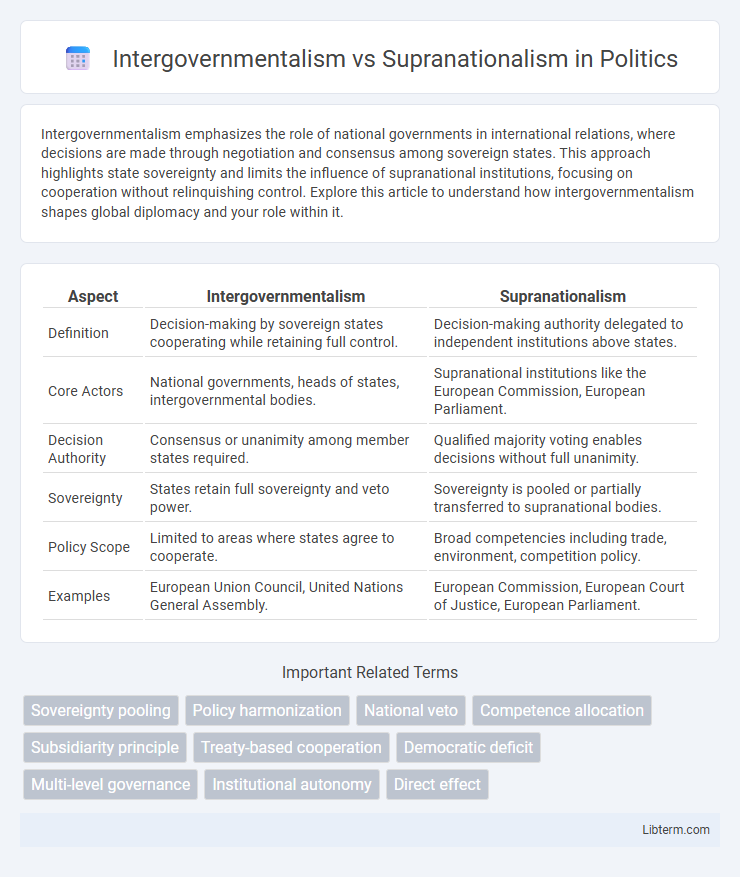Intergovernmentalism emphasizes the role of national governments in international relations, where decisions are made through negotiation and consensus among sovereign states. This approach highlights state sovereignty and limits the influence of supranational institutions, focusing on cooperation without relinquishing control. Explore this article to understand how intergovernmentalism shapes global diplomacy and your role within it.
Table of Comparison
| Aspect | Intergovernmentalism | Supranationalism |
|---|---|---|
| Definition | Decision-making by sovereign states cooperating while retaining full control. | Decision-making authority delegated to independent institutions above states. |
| Core Actors | National governments, heads of states, intergovernmental bodies. | Supranational institutions like the European Commission, European Parliament. |
| Decision Authority | Consensus or unanimity among member states required. | Qualified majority voting enables decisions without full unanimity. |
| Sovereignty | States retain full sovereignty and veto power. | Sovereignty is pooled or partially transferred to supranational bodies. |
| Policy Scope | Limited to areas where states agree to cooperate. | Broad competencies including trade, environment, competition policy. |
| Examples | European Union Council, United Nations General Assembly. | European Commission, European Court of Justice, European Parliament. |
Defining Intergovernmentalism and Supranationalism
Intergovernmentalism is a political approach emphasizing cooperation between sovereign states, where decisions require unanimous consent and national governments retain control over their policies. Supranationalism involves transferring authority to an overarching organization that can make binding decisions independent of individual member states, as seen in entities like the European Union. The core distinction lies in intergovernmentalism's reliance on state sovereignty versus supranationalism's delegation of power to supranational institutions.
Historical Origins and Development
Intergovernmentalism emerged from the Treaty of Westphalia in 1648, emphasizing state sovereignty and cooperation through negotiation without ceding authority to a higher entity. Supranationalism developed post-World War II with institutions like the European Coal and Steel Community, promoting shared authority and decision-making above national governments to foster integration. Historical development reveals intergovernmentalism prioritizes consensus among states, while supranationalism advances binding policies through independent bodies such as the European Commission and Court of Justice.
Key Differences Between Intergovernmentalism and Supranationalism
Intergovernmentalism emphasizes national sovereignty, where decisions require unanimous agreement by member states, preserving state control over policy-making. Supranationalism transfers certain powers to independent institutions that can make binding decisions even if some member states disagree, enabling greater integration. Key differences lie in decision-making authority, with intergovernmentalism prioritizing state consensus and supranationalism relying on majority rule within centralized institutions.
Major Examples in International Organizations
Intergovernmentalism is exemplified by the United Nations, where member states retain sovereignty and make decisions through consensus or voting, emphasizing state control and cooperation without ceding authority. The European Council also demonstrates intergovernmentalism, as national leaders negotiate policies while preserving national interests. Supranationalism is embodied by the European Union's European Commission and the European Court of Justice, institutions that hold independent authority to enact and enforce policies beyond individual member states' control.
Decision-Making Processes and Power Distribution
Intergovernmentalism emphasizes decision-making processes where national governments retain sovereignty and power, requiring unanimous agreement or consensus for decisions, ensuring that member states control policy outcomes. Supranationalism shifts power to independent institutions like the European Commission and European Parliament, which can make binding decisions even without unanimous consent, facilitating more centralized and efficient governance. This power distribution difference highlights intergovernmentalism's state-centric approach contrasted with supranationalism's emphasis on pooled sovereignty and supranational authority.
The European Union: Intergovernmentalist vs Supranationalist Approaches
Intergovernmentalism in the European Union emphasizes member states' sovereignty, where national governments retain control over decision-making and cooperation occurs through consensus. Supranationalism, contrastingly, grants authority to EU institutions like the European Commission and European Parliament, enabling them to make binding decisions independent of individual states. The ongoing tension between these approaches shapes the EU's integration process, balancing national interests with collective governance efficiency.
Advantages and Disadvantages of Intergovernmentalism
Intergovernmentalism allows member states to retain sovereignty, enabling them to make decisions based on national interests, which ensures greater control and flexibility in international cooperation. However, this approach can lead to slower decision-making processes and weaker collective action due to the need for unanimous agreement among states. The balance between preserving autonomy and achieving effective collaboration often limits the efficacy of intergovernmental mechanisms in addressing transnational challenges.
Pros and Cons of Supranationalism
Supranationalism enables member states to pool sovereignty, enhancing collective decision-making and enabling more effective responses to global challenges such as climate change and security threats. However, it can lead to a loss of national autonomy, creating tensions between the authority of supranational institutions like the European Union and individual governments. Critics argue that supranational governance may suffer from democratic deficits and weaken direct accountability to citizens.
Contemporary Challenges and Debates
Contemporary challenges in Intergovernmentalism versus Supranationalism center on the tension between national sovereignty and collective authority, as member states grapple with issues like migration, climate policy, and economic integration. Debates intensify around the legitimacy and efficiency of supranational institutions such as the European Commission and the European Court of Justice, which often face resistance from states asserting intergovernmental control. The evolving geopolitical landscape, including rising nationalism and regional disparities, further complicates the balance between intergovernmental cooperation and supranational governance.
Future Perspectives on Global Governance Models
Intergovernmentalism emphasizes state sovereignty and cooperation through consensus, which may limit rapid policy responses in an increasingly interconnected world. Supranationalism promotes stronger centralized institutions with binding authority, potentially enhancing efficiency and coordinated action in addressing global challenges like climate change and security. Future global governance models might integrate both approaches, balancing national interests with the need for unified decision-making to effectively manage transnational issues.
Intergovernmentalism Infographic

 libterm.com
libterm.com